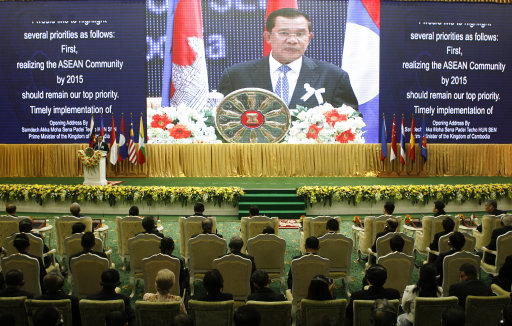ASEAN heads of state will gather Sunday before
meeting with dialogue counterparts from eight countries, including China
and the United States.
The Seattle Times
The Associated Press
PHNOM PENH, Cambodia — Disputes over South China Sea
territories are expected to overshadow a summit of Southeast Asian
countries that opened Saturday, with host Cambodia seeking damage
control after the previous regional meeting it hosted collapsed over how
to handle the territorial conflicts involving China.
Foreign ministers of the 10-member Association of Southeast Asian
Nations, or ASEAN, met at a convention center in the Cambodian capital
of Phnom Penh, where about 10,000 troops and police were deployed to
guard the biggest international gathering the country has hosted in
recent history. Army commandos, armed with machine guns and donning knee
and elbow pads, prowled around the venue.
ASEAN heads of state will gather Sunday before meeting with dialogue
counterparts from eight countries, including China and the United
States.
President Obama will join the summit on Tuesday in his first appearance on the world diplomatic stage since his re-election.
Founded as an anti-communist club in 1967 during the Cold War era,
ASEAN prides itself on having united an unwieldy collective of liberal
democracies and authoritarian states in one regional bloc. But the
grouping — which has been tested by all sorts of crises and disputes —
unraveled at another regional summit last July when host Cambodia
tangled with Vietnam and the Philippines on the handling of the South
China Sea issue.
Cambodia, which has long been economically dependent on China,
refused to allow mention of the territorial disputes in a
post-conference communiqué as demanded by Vietnam and the Philippines,
sparking a high-profile verbal squabble. The rift scuttled the issuance
of any communiqué in an unprecedented moment of disunity in ASEAN's
45-year history.
China, which has been locked in the disputes with the Philippines,
Vietnam and three other governments, has tried in vain to keep the
conflicts from international forums such as ASEAN.
The Philippines and Vietnam, with the backing of the U.S., however,
have taken steps to raise international awareness of the problem, which
they said could threaten the stability and freedom of navigation in the
South China Sea, through which a major bulk of the world's oil and cargo
passes.
ASEAN Secretary-General Surin Pitsuwan said later Saturday that the
disputes were raised by some ministers in a general way, avoiding
specific details of the disagreements.
They discussed how to assuage fears over the conflicts, which Surin
warned have begun affecting "foreign investments coming in, concern
about the safety," access to the waters and energy security.
The governments under the bloc have realized they would have to forge
a common ground on such touchy issues to safeguard the organization
about two years before an ambitious plan to turn the region of 600
million people into an E.U.-like community that could compete with Asian
powerhouses such as China and India.
"I think the situation is going to demand that ASEAN move in one
direction together because the challenges are getting much closer to
home affecting confidence," Surin said.
Still, concerns over a lack of a clear prospect of immediately ending
the worrisome territorial conflicts were palpable. Indonesian Foreign
Minister Marty Natalegawa proposed ASEAN member countries and China
establish emergency hotlines to allow officials to rapidly contain any
outbreak of violence in contested South China Sea areas as a diplomatic
resolution remains elusive.
While all the rival claimants — China, Brunei, Malaysia, the
Philippines, Taiwan and Vietnam — have pledged to peacefully resolve
their disputes, Natalegawa feared an accidental clash could get out of
hand if governments did not have lines of communications devoted to
rapidly contain any outbreak of violence.
"The real challenge for us is miscalculation, misunderstanding, misperception," Natalegawa told reporters late Friday.
The disputes have long been feared as Asia's next potential flashpoint.
Obama and his Philippine and Vietnamese counterparts are expected to
separately reiterate the need to ensure the disputes do not destabilize
the region and block access to the South China Sea, which Beijing has
claimed in its entirety.
Japanese Prime Minister Yoshihiko Noda is also expected to raise his
country's separate territorial problem with China, which recently
flared.
During the summit, ASEAN leaders are scheduled to sign a document
adopting a nonbinding regional declaration to protect human rights,
which diplomats have praised as a milestone in a region notorious for
violations. U.N. officials and rights watchdogs have criticized the
pact, saying it falls below international standards.
The ministers decided to endorse the declaration to their leaders
after the Philippines, a key proponent, successfully urged the ASEAN to
commit the pledges would be enforced "in accordance with international
human rights standards," Philippine Foreign Secretary Albert del Rosario
said.


No comments:
Post a Comment